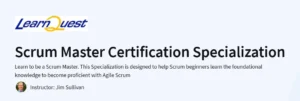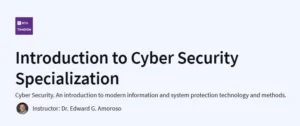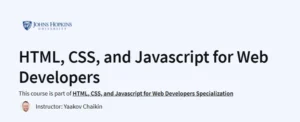What you will learn in Introduction to Python Programming
Identify core aspects of programming and features of the Python language.
Understand and apply core programming concepts like data structures, conditionals, loops, variables, and functions.
Use different tools for writing and running Python code.
Design and write fully-functional Python programs using commonly used data structures, custom functions, and reading and writing to files.
Program Overview
Module 1: Course Introduction, Intro to Programming and The Python Language, Variables, Conditionals, Jupyter Notebook, and IDLE
⏳ 8 hours
- This first module covers an introduction to programming and the Python language. You’ll start by downloading and installing the necessary tools to begin programming and writing code in Python.
Module 2: Loops and Iteration
⏳ 6 hours
- This module introduces loops and iteration in Python. You’ll learn how to use ‘for’ and ‘while’ loops to execute code repeatedly, understand loop control statements like ‘break’ and ‘continue’, and apply these concepts to solve problems efficiently.
Module 3: Functions and Modules
⏳ 7 hours
- In this module, you’ll delve into functions and modules. You’ll learn how to define and invoke functions, understand the scope of variables, and explore the use of modules to organize and reuse code effectively.
Module 4: File Handling and Error Handling
⏳ 7 hours
- The final module focuses on file handling and error management. You’ll learn how to read from and write to files, handle exceptions gracefully, and implement error checking to build robust Python programs.
Get certificate
Job Outlook
Completing this course equips you with practical Python programming skills applicable to entry-level roles such as Python Developer, Data Analyst, or Software Engineer.
The hands-on activities and assignments enhance employability in various fields that utilize Python programming.
This course is part of the Introduction to Programming with Python and Java Specialization, which prepares learners for various programming career paths.
Specification: Introduction to Python Programming
|
FAQs
- Yes, the course is designed for complete beginners.
- No prior programming or Python experience is required.
- Self-paced learning allows you to progress at your own speed.
- Hands-on exercises reinforce practical understanding.
- Only a computer and basic internet access are needed.
- You start small scripts from Module 1 onwards.
- Loops, functions, and file handling enable functional programs by mid-course.
- Final projects integrate multiple concepts learned.
- Real-world scenarios prepare you for entry-level roles.
- Portfolio-ready projects can be showcased for jobs or internships.
- Covers fundamentals needed for Python Developer or Data Analyst roles.
- Includes practical coding exercises to demonstrate skills.
- Builds problem-solving and programming logic.
- Helps in preparing for coding interviews.
- Enhances readiness for further specialization in Python or software engineering.
- The course focuses on Python 3, the current standard.
- Concepts are mostly compatible with Python 2 with minor syntax changes.
- Python 3 knowledge is sufficient for modern applications.
- Exercises and projects use Python 3 exclusively.
- Beginners are recommended to start directly with Python 3.
- Practice coding on platforms like LeetCode or HackerRank.
- Explore Python libraries like NumPy, Pandas, and Matplotlib.
- Join Python communities on Reddit or Stack Overflow.
- Watch tutorial videos for visual explanations of difficult topics.
- Build small projects to reinforce concepts learned.





